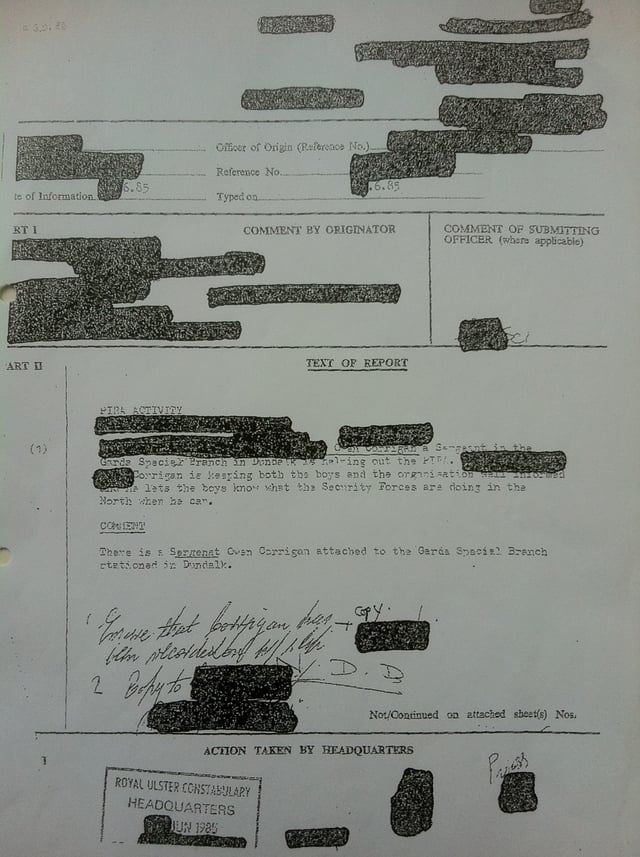The Smithwick Tribunal is drawing to a close but there is still no definite end date.
There is a handful of witnesses still expected to give evidence. Most of them are not confirmed, nor is the most crucial witness former Det Sgt Owen Corrigan. He is ill at the moment and it is not known when he is likely to be in the witness box to answer questions about whether he passed information to the IRA.
His evidence will be crucial for Judge Peter Smithwick to decide if he or any other garda told the IRA about a visit from RUC Chief Supt Harry Breen and Supt Bob Buchanan to Dundalk in March 1989. The two men died in an IRA ambush minutes after leaving that meeting.
While we are still waiting for Mr Corrigan, it is worth reflecting on what we have heard recently and how revealing it has been on a number of fronts.
We have now heard from two of the three former garda sergeants being investigated by the tribunal. Finbarr Hickey was up first and then Leo Colton. Mr Hickey served a prison sentence for signing passport forms, some of which ended up in the hands of the IRA. However, more attention has always been focused on Mr Colton, and, in particular, his working relationships with several republicans in the Dundalk area.
Firstly, while still a sergeant he wrote a letter recommending Brian Ruddy receive a motor dealers' trade plate. Mr Colton said he did not know him and was not paid to provide the letter.
Mr Ruddy was convicted for his role in a multi-million pound racket importing the illegal animal growth promoter, angel dust, into Ireland. Mr Colton told the tribunal: “I never heard anything about that.”
When names of IRA associates of Mr Ruddy were read out he said he did not know any of them.
Mr Colton left the force days before a disciplinary hearing was due to take place into why he wrote that letter.
He later went to work for Jim McCann who had an amusement arcade in Dundalk. Garda also believe Mr McCann had links to the IRA and would often provide bail for people. Mr Colton said he was not aware of any of that.
Around the same time, Mr Hickey said he was approached by Mr Colton and asked to sign blank passport forms, which he did. Some of them ended up in the hands of the IRA. Mr Colton denies he did this and all allegations of collusion.
He was also asked about doing gardening for Mr Eamon Devlin, who had been the subject of a European Arrest Warrant for smuggling. Those charges had now been dropped, the tribunal heard.
None of Mr Colton's answers were long and often consisted of a simple yes or no. One of his most surprising answers, though, came when he was queried about his attitude to the IRA.
“I never had any dealings with them,” he said.
Witness Z was also very significant.
Like Mr Colton, Witness Z kept his back to the tribunal, but he did it to protect his identity. He was the RUC Special Branch officer who wrote the intelligence document, known as an SB50, identifying Owen Corrigan as a garda passing information to the IRA.

To the outrage of the PSNI legal team, the witness said the information came from businessman and smuggler John McAnulty, also known as 'Big Note' because of his flamboyant lifestyle.
Mr McAnulty had not been "green booked" into the IRA (i.e, a member), but he was closely associated with members of all ranks around south Armagh. Witness Z said the officer he replaced had been receiving information from Mr McAnulty for sometime, but when he took over it stopped.
Eventually, the witness phoned the grain importer and said they should talk. He said he told Mr McAnulty it “would be in your best interests” to do so. This was clearly an offer Mr McAnulty was unwilling, or unable, to resist.
He said Mr McAnulty was also providing information to other intelligence agencies.
Somehow the IRA became aware he was passing information. He was abducted, tortured and killed by the IRA in July 1989. The night he disappeared in Co Louth, Det Sgt Corrigan was on duty but had vanished and could not be found. Witness Z said he did not think Mr Corrigan was involved in the death of his source, but he should say where he was on that night.
However it was also the arguments around his evidence which proved to be very revealing.
Mark Robinson for the PSNI said identifying a source, even if he is dead, could stop others coming forward and he accused the tribunal of “radio silence” regarding Witness Z, so no-one knew what he would be saying.
Mary Laverty replied that was to stop him being leaned on to change or not give his evidence at all. What was the point in all this intelligence gathering if it was to be stored away and never used, she asked.
Following a further row over where the PSNI objected to discussing a now redundant system of grading intelligence, Judge Smithwick declared “there must be some limit to the extent the PSNI can cover up important evidence and brush serious matters under the carpet.”
If ever there was a clear sign of frustration at the conduct of the PSNI, then that was it.
Richard Dowling

